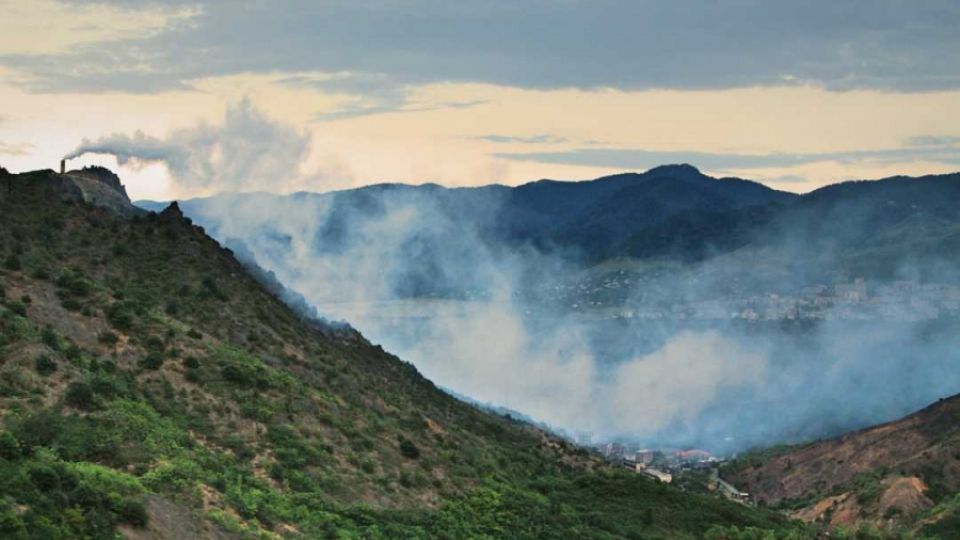Lori Province's mining and metallurgical enterprises in Armenia are likely to be contaminated with dangerous chemicals, mainly copper, beyond legal standards and hygienic standards. Local hotspots that have a direct impact on environmental pollution are located either in close proximity to the urban areas, or directly within them. The samples from the Debed River contain the highest levels of toxic metals, potentially affecting people farming alongside the riverbank, according to experts from the University of Chemistry and Technology in Prague. Local and foreign organizations are calling for rigorous action on governmental bodies.
The copper smelter in Alaverdi, the mine and tailing pond in Teghut, and several tailing ponds around the town of Akhtala have zinc, molybdenum, lead, and arsenic in the environment.
Copper levels found in sediments extracted from the Debed River show a rapid increase in the samples extracted just below the industrial sites, and over the background levels many times. [1]
“The sudden elevation of the values of direct mining and metallurgical effects on the environment by heavy metals,” explains Ing. Marek Sir, PhD., co-author of the research funded by the Transition Promotion Program of the Ministry of Foreign Affairs of the Czech Republic.
“However, even less contaminated water can cause health problems to anyone who gets exposed for a long period of time, for example, by showering, or through farming. Copper, in dry cases, mainly has a negative effect on the liver and kidneys,” remarks the expert from the University of Chemistry and Technology.
Toxic Eggs and Playgrounds
Human health was also analyzed through sampling the human hair of local residents, free-range eggs, and children's sandpits. Half of the playgrounds have been shown to have heavy metal pollution, and children are noticeably highly sensitive and vulnerable to such chemicals. A disturbing concentration of copper was also found in a few samples of hair from people living in an area famous for its UNESCO-listed monasteries.
Speaking about the eggs, Jitka Straková, an expert on toxic chemicals from the Czech NGO Arnika, notes: “In Alaverdi, detected levels of dioxins exceed both European and Armenian standards, in some cases as much as over five times.” As the egg samples suggest, industrial pollution also affects the food chain and causes the danger posed by dioxin-like compounds. "Just by eating an average amount of eggs for the Armenian population, people already tolerate a daily dose of dioxins by the European Food Safety Authority," Straková adds.
The research results were anticipated by the locals, Armenian environmentalists say. "We finally have hard scientific data to prove that people's health is being harmed by the industry as a result of insufficient protection by the legislation and local authorities," summarizes Dr. Elena Manvelyan, head of the NGO Armenian Women for Health and Healthy Environment. ”The responsible authorities have taken immediate and appropriate steps to stop this poisoning,” Manvelyan appeals.
However, the solution might be hard to draw since operations in both Alaverdi and Teghut were recently shut down for business, Ecolur's president Inga Zarafyan points out. The Russian VTB Bank launched a 'Property vs. a. Debt' process from September through October in two companies of the Vallex Group - 'Teghout' CJSC, and 'Armenian Copper Program' CJSC, the owner of the Alaverdi Copper Smelter.
The research was carried out by the laboratories of the University of Chemistry and Technology in Prague, as well as the project of environmental organizations Arnika from the Czech Republic and the Yerevan-based Armenian Women for Health and Healthy Environment, with support from the Ecolur informational portal and Transition Promotion Program of the Ministry of Foreign Affairs of the Czech Republic.
Remarks for editors
Read the quoted reports:
- Heavy metals in the surrounding of mining and metallurgic sites in Lori region in Armenia: https://english.arnika.org/publications/heavy-metals-in-lori-region
- Persistent Organic Pollutants (POPs) in Chicken Eggs from Alaverdi, Armenia: https://english.arnika.org/publications/pops-in-alaverdi-eggs
See a gallery of photos from the sampling: https://english.arnika.org/photogallery/in-armenia-among-ancient-monasteries-and-dangerous-mining
[1] The copper level found in sediments extracted from the River Debed below the Alaverdi factory is thirty-one-times higher (2,200 mg / kg) than that detected above the town. The slowly decreasing figures further downstream are then interrupted by the tributary creeks running from the mining area - the River Shnogh, polluted by the waste of the Teghut mine and the River Akhtala, polluted by the local waste ore plant, in which highest measured levels were found - over 7,000 mg / kg - over the pre-Alaverdi numbers and with hundreds of times. The River Debed flows through the entire South-West region and over the border to Georgia. Along its 152 kilometers in Armenia, it is used by local farmers for their gardens and orchards.







